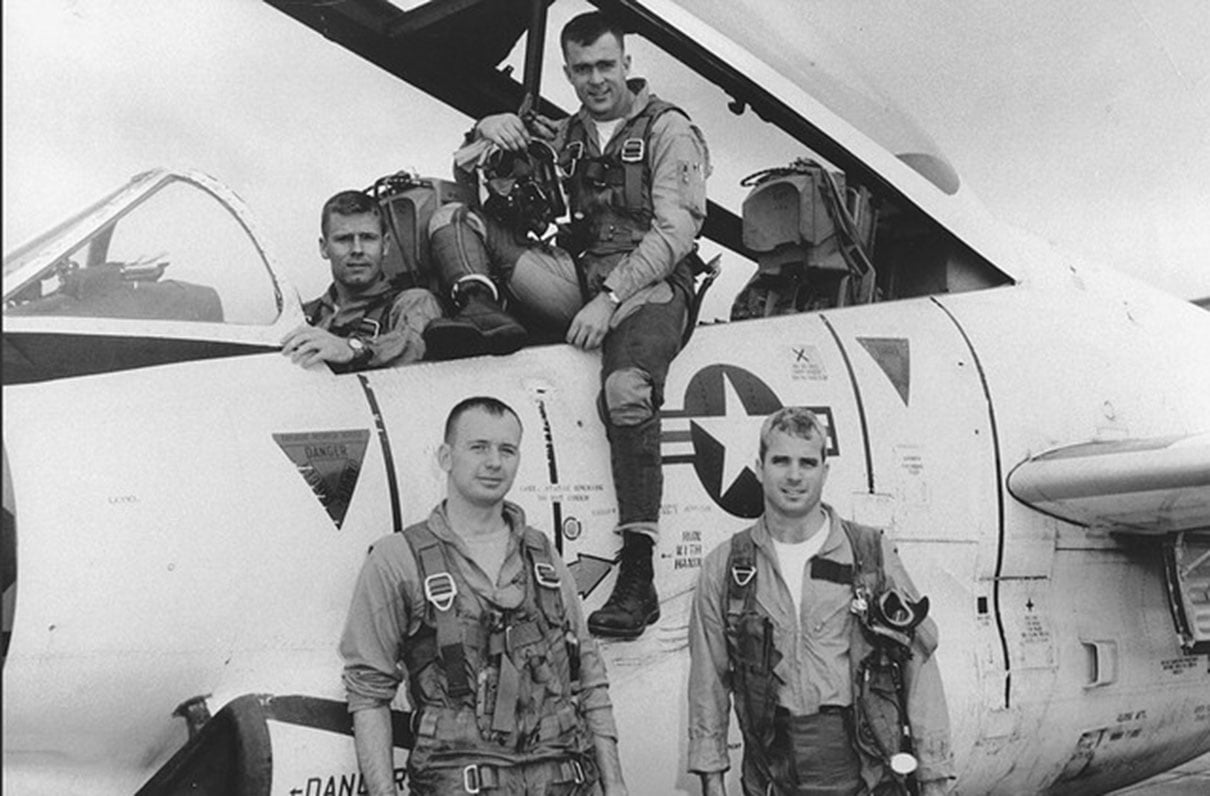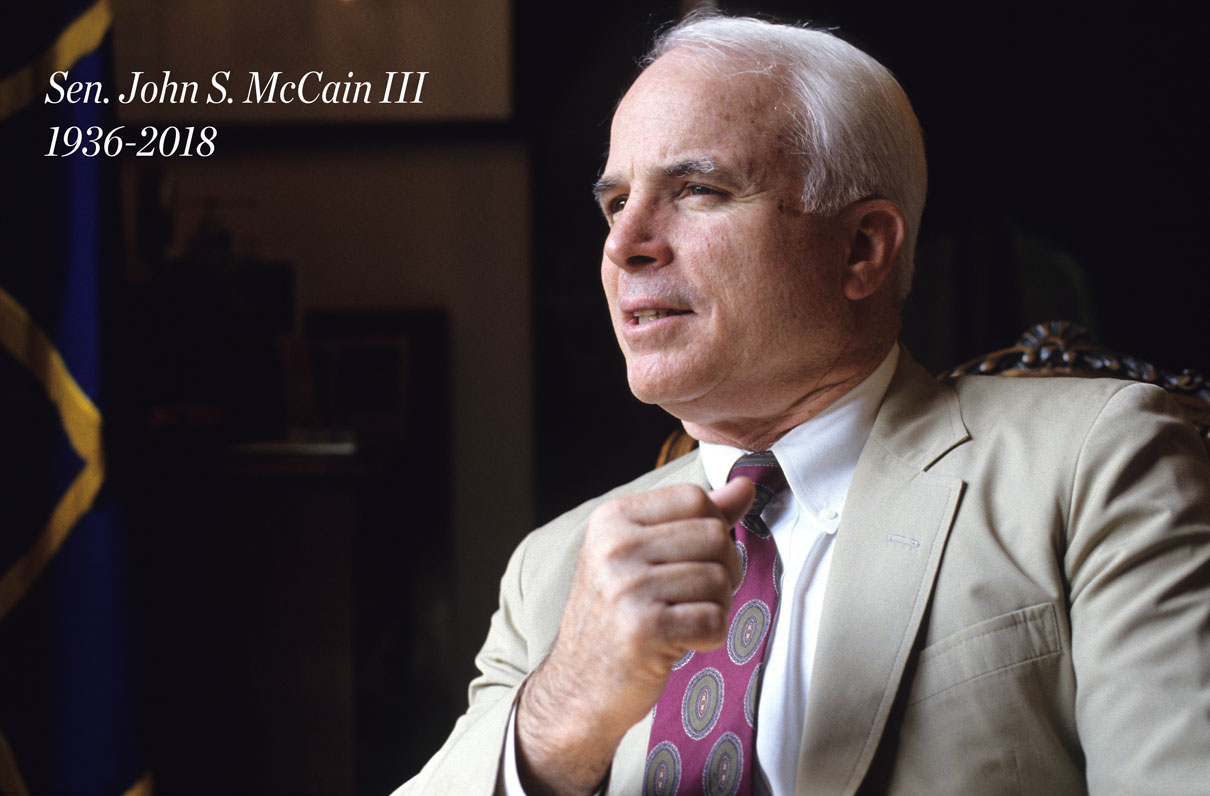Sen. John S. McCain III, a fierce defense hawk in Congress and retired Navy pilot who was held captive for more than five years during the Vietnam War, has died following a 10-month battle with brain cancer. He was 81.
McCain, a Naval Academy graduate and Silver Star recipient who served more than two decades as an officer, died on Aug. 25, 2018. The Arizona Republican and chairman of the Armed Services Committee was serving out his sixth term in the U.S. Senate. McCain, a MOAA Life Member, had been diagnosed with primary glioblastoma, an aggressive brain tumor, in July.
“Our family is immensely greatful for the support and kindness of all his caregivers over the last year, and for the continuing outpouring of concern and affection from John's many friends and associates, and the many thousands of people who are keeping him in their prayers,” said the McCain family.
McCain spent nearly six years in the infamous Hanoi Hilton, a North Vietnamese prison, after his plane was shot down during an Oct. 26, 1967, bombing mission. Injured from the crash, McCain was beaten and tortured there for years, leaving him with permanent disabilities. He later refused to be released ahead of prisoners who'd been held captive longer and would spend two years in solitary confinement.
McCain was later awarded the Silver Star, the nation's third-highest combat valor medal, for his “determination, courage, resourcefulness, and devotion to duty” during his time as a POW, according to the citation.
McCain was born in the Panama Canal Zone on Aug. 29, 1936, to his parents John and Roberta. He had two siblings, and his father and grandfather were both Navy admirals. McCain followed in their footsteps by earning his commission after graduating from the Naval Academy in 1958 and retiring as a captain in 1981.
“Senator McCain certainly honored his father's and his grandfather's service,” said retired Navy Capt. Jim Carman, MOAA's vice president of council/chapter and member support who served in one of McCain's squadrons. “He certainly set a very high standard for the pilots he worked with and that flew for him.”

Getty image
McCain admirably carried on the legacy that is embodied in the Navy destroyer John S. McCain (DDG-56), Carman added, which is named for the two senior McCain officers.
The longtime senator's absence will be felt in Washington, D.C., too. In 2008, McCain was the Republican nominee for president, but he lost the election to President Barack Obama. On Capitol Hill, McCain was known for asking tough questions of military leaders and ensuring the Defense Department spends American taxpayer dollars wisely.
“Senator McCain, known and rightfully praised for keeping Pentagon spending in check, was also a tireless advocate for the men and women in uniform,” said MOAA President and CEO Lt. Gen. Dana T. Atkins, USAF (Ret). “He championed higher military pay to match the private sector. He also fought for tax relief to benefit military homeowners, survivors, and reservists. McCain never stopped serving.”
A determined leader
When McCain returned to the States after he was released from captivity in 1973, he wanted to continue his naval career. By 1976, he was serving as commanding officer of Attack Squadron 174 (VA-174), a training squadron based at Naval Air Station Cecil Field, Florida. Carman was there then to train to fly the A-7 Corsair II a carrier-based light-attack aircraft. He'd already had several leaders who'd been held captive during the Vietnam War who went onto continue their naval careers.
The troops they led and trained had a great deal of respect for their commanding officers' experiences, Carman said.
“When you have a Silver Star recipient as your commanding officer and you're in the business of training young men to go do hard things in harm's way, someone who'd been through what Senator McCain had been through brought a certain amount of credibility,” he said.

John McCain, bottom right, stands with members of his Navy squadron. (Navy - Library of Congress)
McCain was a no-nonsense leader. Carman said he was only dressed down once by the late-senator after an arrested landing on a runway - using the tailhook Navy and Marine pilots use to rapidly slow an aircraft on a ship.
Carman was the third aircraft to land on the runway when he noticed the planes in front of him weren't moving quickly enough. At 140 mph, Carman said he decided to drop the hook.
McCain was waiting for him when he got back to the squadron's ready room.
“He said something like, 'What the hell's going on out there?'” Carman recalled. “I explained about being concerned at the other two guys getting out of the way and being cautious, I took the gear. 'OK, get out of here!' he said. That was my counseling from McCain.”
McCain was incredibly focused on getting pilots trained and into the fleet, Carman said. He'd been in the Navy for nearly two decades at that point, and understood the skills pilots needed to be successful in high-stress situations.
Just weeks before McCain's plane was shot down over Hanoi, for example, he was nearly killed in a flight deck fire aboard the aircraft carrier Forrestal (CV-59). A Zuni rocket discharge led to a chain reaction of explosions aboard the Forrestal. McCain escaped his plane on the flight deck with just minor injuries, but the blasts killed 134 sailors.
Those are the kinds of vital experiences combat veterans-turned-politicians bring to Washington.
“Before they cast a vote to send men and women into hostile action, they're going to be sure this is of significant national priority that justifies the potential loss of life in defense of ideals that are important to us and our allies,” Carman said.
A legacy of service
McCain continued advocating for servicemembers long after he hung up his uniform.
When Congress failed to pass proper budgets in recent years, McCain was quick to point out that running on continued resolutions, which left the military services capped at the previous year's spending levels, was only going to hurt rank-and-file troops.
“If this is the path Congress decides to take, we must know the consequences we are choosing for our men and women in uniform,” he wrote in a 2017 statement ahead of a looming deadline that could shut down the government.
In 2004, MOAA recognized McCain with its highest award for members of Congress: the Arthur T. Marix Congressional Leadership Award, named after the Marine officer who founded the association in 1929.
“McCain was then recognized by MOAA for his decade of leadership in the fight for concurrent receipt and as the champion of two other legislative victories - military pay comparability and tax equity,” said retired Army Col. Mike Barron, MOAA's director of government relations for currently serving and retired affairs.
Because of McCain's work in the Senate, military homeowners, survivors, and drilling Guard and Reserve members won substantial tax relief. At the awards ceremony, McCain accepted the award “on behalf of my fellow citizens who have an appreciation for the service by the men and women in the military.”
In his new memoir released on May 22 titled “The Restless Wave,” McCain acknowledged his terminal illness and said this Senate term would be his last. McCain was taking care of “some work that needs finishing, and some people I need to see” in the wake of his diagnosis, he wrote.
That included addressing the public he'd served for so long.
“I want to talk to my fellow Americans a little more if I may,” McCain wrote.
McCain credited much of his success in the Capitol to compromise. In his book, he urged Americans to remember the importance of respecting each other's viewpoints amid a politically polarizing climate.
“We are secluding ourselves in ideological ghettos. We have our own news sources. We exchange ideas mostly or exclusively with people who agree with us, and troll those who don't,” McCain wrote. “…We have to recover our sense that we're part of a community that's larger than our political cohort.
“We all, despite our disagreements, have shared interests and values.”
